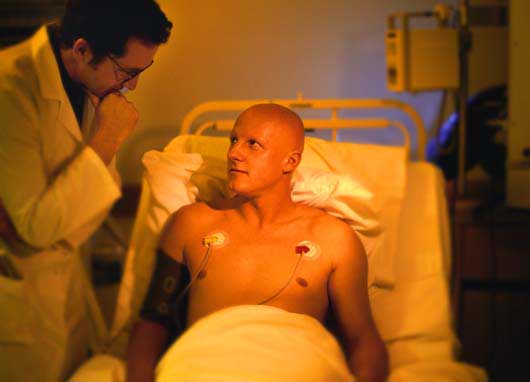Can Cancer Patients Suffer from Somatic Symptom Disorder?
Three years ago, Christine was told she had breast cancer.
I wasn't actually told cancer. It was your tumor is malignant. And your thought is, I'm going to die because you don't know anything else except you just immediately assume the worst. And you think, I'm going to die. And I'm going to die a horrible painful thing.
Bye.
Bye mom.
And I have two young children. And all I could think was my children need me. They're too young to be without a mom.
Then once you've, kind of, got yourself together you think, right, what happens next? And your told what your treatment's going to be. And mine was chemotherapy.
Your whole body was saying don't go. I can remember walking from the car park into the hospital. Everything in me was saying don't go in there. Turn back because you know what it's going to be like. And each time, it seemed to get worse.
As soon as this is injected into your system, you felt it going down the back of your throat right down to your groin area. The most awful metallic taste, which as I'm talking to you, I can feel my throat getting dry. It was dry and it was metallic.
16 years ago at Aberdeen's Royal Infirmary, Dr.Leslie Walker decided to try to help his cancer patients reduce the distressing side effects of chemotherapy by teaching them to relax.
In the early 1980s, we found that some patients had a very hard time with their chemotherapy side effects. The treatment which we developed consisted of training the patient in special relaxation methods. And we were delighted to find that, in fact, it was successful in reducing the amount of nausea and vomiting the patients had.
In itself, the relaxation therapy was not remarkable. But five years later, they stumbled across a mystery hidden in the hospital records. The patients who had used the relaxation techniques had survived for longer.
We were astonished by these results. And they bothered us greatly. Indeed, we delayed publishing them for several years because we thought that something must have been wrong with the analysis. But we rechecked the data, and we found that this was the case.
Once again, doctors were forced into an unexpected conclusion. The mere act of relaxing appeared to help patients live longer. Although, it didn't actually cure them. Dr.Walker was concerned these results were a fluke. He decided to set up a new trial.
Right, Leslie. You see this very large tumor. A quite dense area with irregular speculated margins. By contrast, when we look at the mammograms taken after the chemotherapy, the tumor has completely disappeared.
Psychologist Dr. Walker teamed up with a surgeon, Professor Eremin. They investigated whether relaxation and imagery could help stop the breast cancer cells spreading after the tumor had been removed by conventional treatment, chemotherapy, and surgery.
I'm very much aware of the limitations of surgery when the disease is advanced. And in spite of other treatments such as radio therapy and chemotherapy, we know that some patients still die of disease which has spread elsewhere. So we're interested in exploring other revenues. And in particular, we're very interested in the ability of the body's own defenses to be able to deal with their malignancy.
96 women took part in the trial. They all had the standard treatment to remove their tumors. Chemotherapy followed by surgery and radio therapy. Half of the group of women also spent time every day imagining that their cancer tumor was being attacked.
I used to imagine my tumor was a monster like a child's Boglin. That was how I thought. And it was in a cage, and it writhed about in this cage. And it was trying to get out of the cage. And that was important to me because my biggest fear was that this tumor would spread. So it was always so important that this monster never got out of the cage.
Over a three year period, Eremin and Walker examined blood from the two groups of women and measured the activity of their natural killer cells. Natural killer cells are thought to help fight the spread of breast cancer. Their results were astonishing.
We found a number of immunological differences between the two groups. In the patients who practiced relaxation and imagery, we found that some of the white cells that are thought to be important in terms of targeting and killing cancer cells were enhanced.
These two natural killer cells are attacking a cancer cell. The breast cancer trial is not yet finished. But so far, it seems to show that the women who keenly and consistently practice relaxation and imagery have more active natural killer cells. This doesn't provide a cure. But combined with the normal treatments for cancer, it may mean that they're able to help prevent the spread of cancer throughout the body.
It's difficult to know precisely what it means. But it does suggest that we were able to increase the number and the percentage of these in the circulation. And possibly, these may have an anti-cancer effect.

